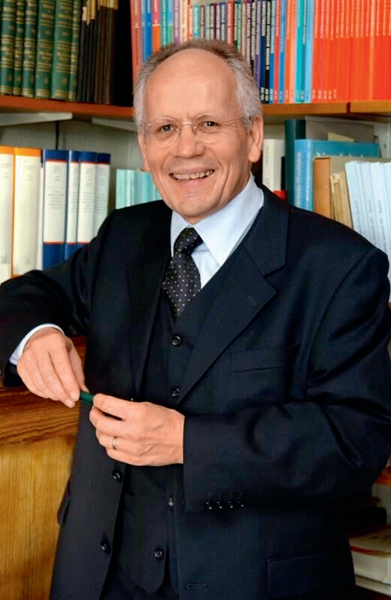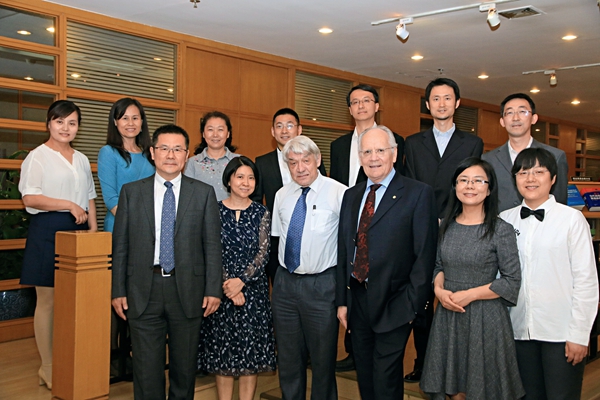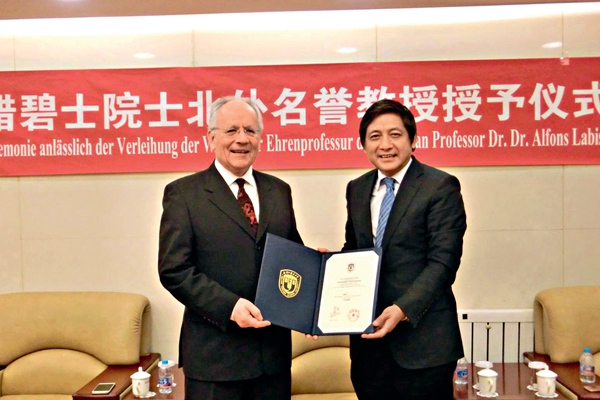By SABINE WEBER
By SABINE WEBER
INTERDISCIPLINARY work is a fundamental skill in the current international scientific and academic discourse. However, profound intercultural cooperation is only possible under the maxim of exchange on an equal footing: The experience must be mutually beneficial for all parties involved.
Furthermore, linguistic capability for dialogue and a basic knowledge about the cultural background of the counterpart appears to be only one of the core aspects to successfully achieve this communicative goal. The openness to be culturally tolerant must also complement the cognitive ability, as well as empathy to understand alternative world views within their own context.

Only in this way can the bridge be built to another’s cultural space and understanding of their distinct cultural identity. This facilitates the exchange of cultural understanding and the sharing of disciplinary expertise between individuals hailing from vastly different backgrounds and approaches to the specialized disciplines.
That is the reason why scientists from disciplines other than philology or linguistics are actually often the ones who end up contributing in extraordinary ways to intercultural research on a global scale.
One scientist who perfectly fits this description is the German scholar Alfons Labisch.
Labisch studied philosophy, social science, history, and Latin at the RWTH Aachen and the University of Koeln in Germany. He continued his studies in the field of natural science, becoming a licensed physician and, in 1982 in the city of Aachen, successfully completed his doctorate in both philosophy and medical science.
This unusual and fascinating academic accomplishment, combined with his publications in the field of sociology and the history of medical science, garnered much positive attention from his contemporaries and the scientific fraternity at large, leading to his appointment in 1979 to the University of Kassel as a professor of Health Policies and Medical Sociology.

During his research, dealing with the main question of what was the significance and effects of health and healthcare on society, the aspect of intercultural exchange, particularly with East Asia, became more apparent and relevant for Labisch.
This growing fascination – at first personal, later professional, and finally institutional – led Labisch, already a holder of two PhDs and numerous other academic accolades, to add the honor of a second professor title to his formidable portfolio.
To thank and honor the German scholar for his longstanding contributions in the field of intercultural cooperation and academic exchange, Peng Long, principal of the renowned Beijing Foreign Studies University (BFSU), awarded Labisch with the title of a honorary professor. The Chinese version of honorary professorship is the highest academic honor a Chinese university can bestow upon a foreign scholar.
China Today conducted an exclusive interview with Professor Labisch and spoke with him at length about the interesting circumstances that led the German historian, sociologist, and medical expert with a classical European academic background to be a professor at a Chinese university.
Interests in Asian Culture
Since childhood, Labisch revealed, he had been quite the bookworm. He must have been around eight, when a special book fell into his hands, Die Welträthsel by Ernst Haeckel, written in 1899. This monumental 500 page tome introduced Darwin’s theory of evolution into fictional literature. And its descriptions of the former Dutch colonies in the Southeast Asia awakened an insatiable wanderlust for Asia in the young Labisch.
Many years later, this childhood dream found fulfillment through the adventurous spirit of a fellow student, a young Indonesian. The two young physicians were particularly interested in the question of how the epidemic of malaria was contained in the Dutch colonies at a time when people only knew about bacteria, but antibiotics had not yet been discovered.
To study this matter in the field, Labisch and his friend decided to travel from one Indonesian island to another. It was at that time that Labisch fell deeply in love with this Southeast Asian nation and its people. “Indonesia is the most diverse country on earth. Its 12,500 islands with their vast number of languages, cultures, culinary diversity, and religions are unparalleled on this planet. The people are warm and welcoming,” Labisch said.

Only some time later would Labisch gain another opportunity to personally interact with another Asian culture. One day, as Labisch was working as a professor of medical history at the Heinrich-Heine-University in Dusseldorf, some postdoctoral researchers from Japan knocked on his office door. They explained to Labisch that they had especially traveled from Japan to attend his lectures in Germany. Only later did Labisch discover that not only were his books widely read in Japan, but that they were actually broadly discussed.
“These young men knew my books by heart,” Labisch recalled. “I really had no idea about the success of my works in Japan. I just always did and still do what I felt an interest in. I deal with problems that lead me to new knowledge and raise new questions, in short: I always did what I felt like doing.”
Labisch said: “My approach to connect classical historical science, sociology, and medical science with each other and to follow up with the question – what leads human society and civilization to pursue the desire of wishing to be healthy and what this desire meant for medical science and physicians? – was completely new.”
“There were no established methods, no standard books which I could have had referred to. So I tried to answer my questions with established methods from social sciences and the humanities and hoped for answers that would further my knowledge. However, I had never imagined that my work would inspire this kind of reaction on the other side of the world!”
This unexpected visit was the starting point for a long-lasting exchange between the German scholar and Japan, as well as Japanese scientists, which would not only lead to several new academic publications, but also to a special honor for the German professor. He received the “Order of the Rising Sun, Gold and Silver Rays,” the highest honor Japan confers upon foreign civilians, which is presented by the Tenno himself or by one of his overseas consular representatives.
However, it would be several more years till Labisch’s first visit to China. Labisch expressed regret at not being able to visit earlier. But at this time, he was still lacking any kind of personal contact with Chinese locals – and venturing around like a simple tourist simply had no appeal to him at all.
Eventually this “personal contact” walked into his office in the form of three dedicated young men. At that time, Labisch held the position of the rector of Heinrich-Heine-University Dusseldorf.
These three driven men were the head of the University International Office Dr. Werner Stüber, the director of the University Language Center, Dr. Peter Hachenberg (who taught German for five years at BFSU in the 1980s) and Dr. Li Xuetao, who at that time had just finished his doctorate at the University of Bonn (and who currently functions as professor and head of the Institute for Global History at BFSU).
The three scholars presented the idea to establish a Confucius Institute in Dusseldorf, which, at that time in 2004, was a novel concept in the academic landscape. To realize this plan, they needed the help of the University of Dusseldorf.
Rector Labisch was immediately taken by the idea and promised his full support. In December 2006, the Confucius Institute officially opened its doors with Labisch serving as chairman of the sponsoring association, and also as a member of the Council of Hanban (the Office of the Chinese Language Council International), which functions as the central headquarters of all Confucius Institutes worldwide in Beijing.
In his new role as an active member of the Hanban Council from 2007 till 2009, Labisch worked at the institutional level as well as played an important supervisory role at the global level. Even to this day, as one of the few honorary members of the council, he still actively participates in many projects of Hanban.
“However, this was only the formal, the professional part of my connection to China. I was also personally deeply interested in Chinese society and culture. China is the only civilization in human history which developed over a period of at least 2,500 years in the same geographical area and to this day still thrives there and, as can be clearly witnessed, flourishes.”
“China Is different!”
China’s geographic location allowed sociocultural and intellectual development in a direction which differed vastly from the one in continental Europe. Thus, China found very different answers to fundamental questions of human existence and world experience than the people on the other side of the world. These ranged from, for instance, ideas concerning the self-perception of human beings, the relation between humans and society and also the relation between humans and nature.
This resulted in a different perspective on the world and perception of reality, including the perspectives on truth, deductions leading to the truth and what meaning these cognitions give to people’s lives. “China is different!” Labisch underlined. And it was exactly this otherness that made the intercultural dialogue with China so fascinating for the German scholar.
The Chinese worldview offers alternatives, which become a mirror for the Western perception of the world. This is true not only for matters of daily life, cultural traits and the order of human beings, family and society, but also for human relationships with nature, with science, philosophy, and theology.
The case of a huge country like China with a rich history and a large population, and all this without having a state religion, is a unique concept that not only caused fascination since the Enlightenment among some well-known European philosophers like Leibniz, but also evoked repulsion among others like Hegel.
The Chinese “mirror” provides Europe with new insights into its inner-self and its perception of the world. And it is exactly these differences and points of friction which, for Labisch, offer the potential to provide a closer understanding of the “conditio humana” and a more sophisticated image of the general condition of humankind.
Which dimensions for action and involvement are implemented and possible in human nature? And how do these options become real under different natural and social conditions? These questions are, at some level, relevant to scientists of all fields.
Thus, it seems almost natural that an accomplished historian, sociologist, and physician such as Labisch became part of an organization which primarily aimed at the dissemination of a culture, which he himself had never witnessed on its own soil.
Distinctions in Medicine and Healing
“In Europe, as well as in China, the perception of illness and health experienced a paradigm shift during the period between around 400 years prior to and 200 years after Christ,” Labisch explained. “At that time, a completely new world view emerged in the perception and interpretation of human health and sickness, not only from the perspective of human nature, but also considering personal order, the order of society, and global order as a whole.”
In the centuries before that time, illness and physical suffering were widely regarded as consequences of upset ghosts, demons, or ancestors. However, in the texts originating from the time period when the change of people’s mindset took place, illness was no longer considered a consequence of supernatural entities, but rather as something that could be explained as natural phenomena, and thus could be integrated into the framework of men’s contemporary view of nature.
From this point on, the human body was seen analogous to the perception of nature. On the other hand, this perception of nature also corresponds to the perception of society and the organization of the community, i.e. an organic model.
Terms, formerly used to describe natural phenomena, were now also applied to the human body. Changes and symptoms were now perceived as causal, natural influences, closely connected to each other.
This new perception of health also revealed a new definition of human behavior towards society and nature. In the European tradition, this trend began as early as Hippocrates, who considered disharmony within the human body as a consequence of the interactions of the four bodily fluids and their specific qualities, which in his view also corresponded with the four basic elements and qualities.
Meanwhile, in ancient China, correlations were discovered between the function of organs, the functional systems of the body, and the five phases.
Although both approaches differ vastly in their underlying ideas and concepts of illness, they associate organs and functions of the human body with the organic perception of nature and its changes. This meant that the human body was liberated from the context of demonology, animism, and familial-cultic relationships and became embedded into a naturalistic-scientific worldview.
In contrast to China, however, European scientific tradition experienced a break in the 16th and 17th centuries, which upended the scientific worldview of the past.
“Individuals like Galileo Galilei and Isaac Newton began to isolate single observations, reproduced them in experimental form, quantified them through analysis and abstracted theories as a result. These theories then in consequence allowed technical applications,” Labisch explained.
“This new method served to prove universally valid claims of truth of knowledge in an experimental way, to explain it in a mathematical way comprehensible for all and to make it technically available for everyone. Thereby, it caused an unparalleled shift in European sciences, which didn’t take place in the same way in China.”
Despite the initially slow and then, from the mid-19th century onwards, rapid ongoing development of modern medicine, the European medical knowledge of ancient times and the middle ages is not completely forgotten but survived inside the realm of traditional folk medicine.
Old and New, Competitive and Complementary
In East Asia (in general), as well as in China (in particular), this empirical approach based on the application of the scientific method initially appeared as a foreign entity. However, the reproducible and verifiable effects of the new cognitive mode were found fascinating and eventually led to growing acceptance.
For traditional Chinese medicine, the new concepts from the West brought about a difficult time of explaining and justifying its methods and achievements. Chinese medicine had to redefine and legitimize itself.
Meanwhile, China also faced the daunting task of providing at least basic healthcare for a large number of people in the peripheries of the vast country.
This was the starting point for a discussion that lasts to this day and projects this narrative of a “competition” of sorts between modern Western medicine and traditional Chinese medicine. The debate becomes further convoluted due to the emotional dimension on one end, and lack of well-informed opinions on the other.
For modern physicians, the encounter between modern and traditional medicine revolves around the question of where and how the veracity of the medical effects can be proven.
“Surely, from an objective perspective, modern Western medicine has in this aspect achieved greater success,” Labisch said. But at the same time he feels people should also be aware of the many highly valuable though mostly indirect approaches of traditional Chinese treatment methods.
This, in his opinion, is particularly true for everyday symptoms and preventive healthcare – for example, dietary means or physical exercise. In this way, traditional medicine complements modern methods, suggested Labisch.
However, this is only a small aspect of the true potential of what traditional Chinese medicine has to offer. Its traditional remedies and formulae possess multiple means of extracting positive effects also in a modern sense.
“A good example for this is Tu Youyou. In 2015, the female Chinese pharmacologist was awarded the Nobel Prize for medicine for her work in the 1970s, when she examined the efficacy of annual mugwort in the treatment of malaria. In traditional Chinese medicine this plant was known for centuries and treasured for its pharmaceutical effects,” Labisch explained.
However, Tu Youyou was the first to use the methods of modern Western medicine and scientific research to identify and isolate the specific active ingredient: Artemisinin. Her discovery and approach resulted in the possibility to develop and produce medicines useful in the treatment of patients suffering from malaria.
“Today, artemisinin-based combination therapy (ACT) is used worldwide to treat acute malaria. ACT is a global success story of traditional Chinese medicine,” Labisch said.
“This example shows that if traditional Chinese pharmacology verifies its findings with the scientific and clinical methods of modern medicine, it can bring wonderful results and approaches that are effective, ideally without any side effects, and can also be used by modern clinical medicine. That is where I see the future of traditional Chinese medicine.”
SABINE WEBER is a PhD candidate of Sinology at the University of Bonn, Germany. She is currently located at BFSU, Beijing, conducting research on representations and perceptions of technology and knowledge transfer in late Qing Fiction.